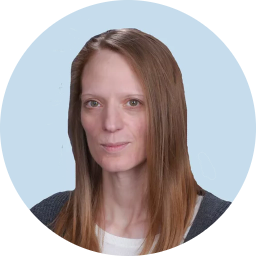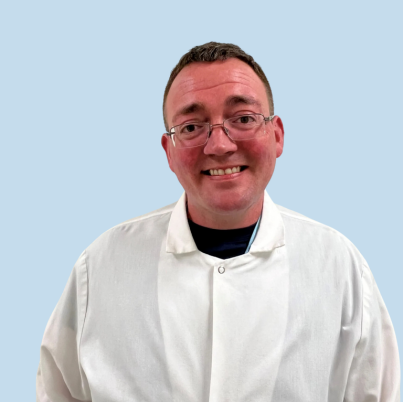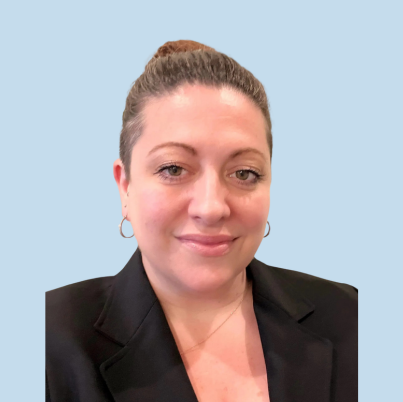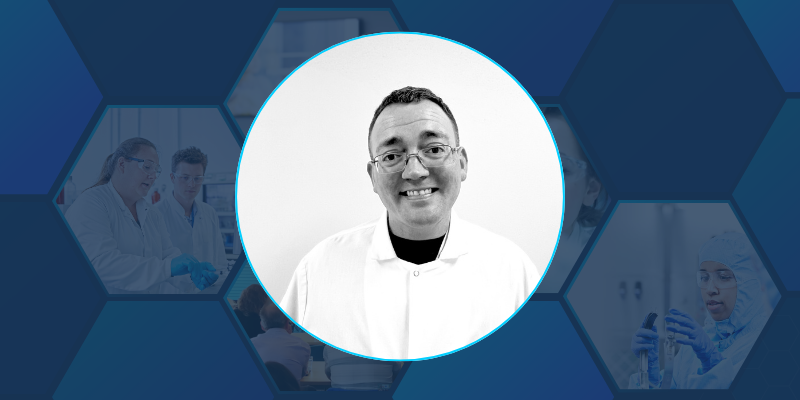In this interview, John Entwistle, Analytical Scientist at our Philadelphia facility, shares a day in the life of his role.
John Entwistle is the Analytical Scientist in the Quality Control Department at our Philadelphia facility, where he works on clinical phase projects, performing release and stability testing for the manufactured products.
After about 4 years, I left Quotient Sciences for a role outside of the company but later decided to return for better work-life balance and because of the relationships with others that I valued.
- John Entwistle
What does an Analytical Scientist do at Quotient Sciences?
As an Analytical Scientist in the quality control department, my role is collaborative. I work on clinical phase projects, performing release and stability testing for the products manufactured at Quotient Sciences. I am part of a team of three analysts, where we review each other’s data and reports, ensuring our work is completed fully and in a timely manner. This collaborative environment is a key aspect of our team's success.
Describe a typical day in the quality control department?
All final products undergo four typical tests: appearance, water content, assay, related substances, and dissolution. Depending on the product type, a few more tests may be required for release.
An average day in my department really depends on the type of sample we are testing. When I test stability, it is easy to plan because I know when the Stability Coordinator will be pulling samples and which tests are required, so I can set up my testing schedule and plan my day easily. With a release sample, we are aware of the testing needs but need to be flexible about when the sample will be submitted to the lab.
In a week, after I have my assigned samples, I usually spend the beginning of the week preparing the reagents and materials for all the tests. Then, I will start to perform testing based on the availability of equipment. The group has other responsibilities outside of testing the drug product, including review and report generation. We typically plan for those activities in between sample testing or after all the samples have been tested.
In your view, what makes Quotient Sciences unique?
One of the most exciting aspects of my role is working on the delivery of Quotient Sciences’ Translational Pharmaceutics® programs. This innovative approach allows us to manufacture, test, and release drug products at Quotient Sciences - Philadelphia, which are then shipped to Quotient Sciences - Miami for dosing in our Phase I clinic. This unique offering enables us to conduct cGMP manufacturing and clinical research in a condensed timeframe, delivering results to the customer faster than traditional drug development methods. It's a thrilling opportunity to be part of such cutting-edge work.
When working with a Translational Pharmaceutics® sample, it is a very short turnaround time and we need to be extra prepared before the sample is ready to ensure we meet the timelines. We make sure everything from reagents and materials to instruments are all ready to go and prepared before the sample arrives for testing.
How has your career progressed since joining us?
I have been lucky here at Quotient Sciences to transition into roles in different groups and learn new skills and aspects of the business. I began my career in the cleaning validation, raw materials, and sampling group at Quotient Sciences’ Chelsea Parkway facility, before our Garnet Valley facility was planned to be built. In that role, I learned a lot about the manufacturing rooms and equipment, sampled raw materials to be tested, and released them to manufacturing to produce the drug products. From there, I moved into commercial quality control doing in-process testing and final product release and stability. There, I learned to test large volumes of samples, sometimes up to 60 dissolutions in one month! I then transitioned into analytical development where I was performing method development, method qualifications, and late-stage method validations.
After about 4 years, I left Quotient Sciences for a role outside of the company but later decided to return for better work-life balance and because of the relationships with others that I valued. I re-joined the company and have been in my current role within the quality control department doing clinical phase work ever since. At this time, our Garnet Valley facility was built so I began working there. Our Garnet Valley and Chelsea Parkway facilities are only a little over a mile from each other so working between sites is very easy. If a project starts at one site, sometimes the client wants their product tested at that site. When this occurs, I end up switching sites to perform testing. What can be challenging with changing sites is securing instrumentation to do testing. Fortunately, with the LIM’s system and instrument manager being put in place, this challenge should be eliminated in the future.
How do you collaborate with colleagues at our two Philadelphia sites, as well as with our UK and Miami facilities?
Both Philadelphia sites essentially started at Chelsea Parkway and then our Garnet Valley facility was built. The two sites basically function as one. As I mentioned, the two facilities are only about a mile away from each other. Most of the employees have functions at both sites so it is not unusual for people to be at both sites on the same day.
My collaboration with the United Kingdom facilities mostly involves new projects transferring to the United States. We work together to plan what steps need to be in place to successfully integrate the projects into our workflow.
Additionally, I work with both the UK and Miami sites on Translational Pharmaceutics® programs. Together, we work through a tight timeline to manufacture, test, release, and dose. We manufacture, test, and release drug products at Quotient Sciences - Philadelphia. These products are then shipped to Quotient Sciences - Miami for dosing in our Phase I clinic. This allows us to get results to customers in a shorter timeframe, a key benefit of out Translational Pharmaceutics® platform.
What experience did you have before working at Quotient Sciences, and what other learning opportunities have you had since joining?
For my role, a bachelor’s degree in chemistry or a science related field was required. I met this criteria, holding a BS in Biology. I had three years' experience in environmental, performing Ion Chromatography, HPLC, GC. I also had two years' experience in the medical device area testing similar instrumentation.
Through my role at the company, I have gained more knowledge in the development and implementation of Labware ELN. I was elected as one of the first people to use the system and provide feedback. Eventually, I became part of the power users’ team. In this team, we work through any issues that arise and make decisions on what we want the program to do for us and look like. With my help, there has been a successful role out of Labware ELN at the Philadelphia site.
What do you enjoy most about your role, and what is the most challenging?
I like that I can work between groups to meet the goals of our company. Having experience in multiple groups has helped me embrace many ways of looking at the same situation and find creative ways to work through them. For example, I have knowledge of testing and release from raw materials to final product. Using that knowledge, I can deduce down the minimal time needed to deliver for a certain product.
I would say that the most challenging part of my role is scheduling Translational Pharmaceutics® in with routine testing. Since the timelines for Translational Pharmaceutics® are so rigorous and short, it is important to be able to halt normal testing and focus on Translational Pharmaceutics®, then revert back
What’s the team like?
The QC department is a great group of people, and working with them is my favorite part of the job. We always help each other out and work well together. We have in our Standard Operating Procedure (SOP) that all testing for stability must be started within 30 days of the pull date (date pulled from the stability chamber). If we start testing after the 30 days, the client must be contacted and a deviation is taken out by QA to explain why testing was not performed. If any testing gets close to being out of the testing limit, someone else on the team will help and pick up testing needs. This is just one example of how we collaborate and work well together to reach our project goals as a team.
What advice would you give to someone applying for a role in your team?
I would say it is a great place to learn. There is a lot of knowledge across all functions, so my advice would be to take in as much information and knowledge as possible from collaborating with our teams.
What do you like most about working at Quotient Sciences?
Everyone works together and will always help you if you need something. We all have the same goal for our clients, and each person does whatever they can so customers and patients are getting the best product possible. We also have events to celebrate employee milestones, and there are often events happening on-site that help to build relationships with one another.







